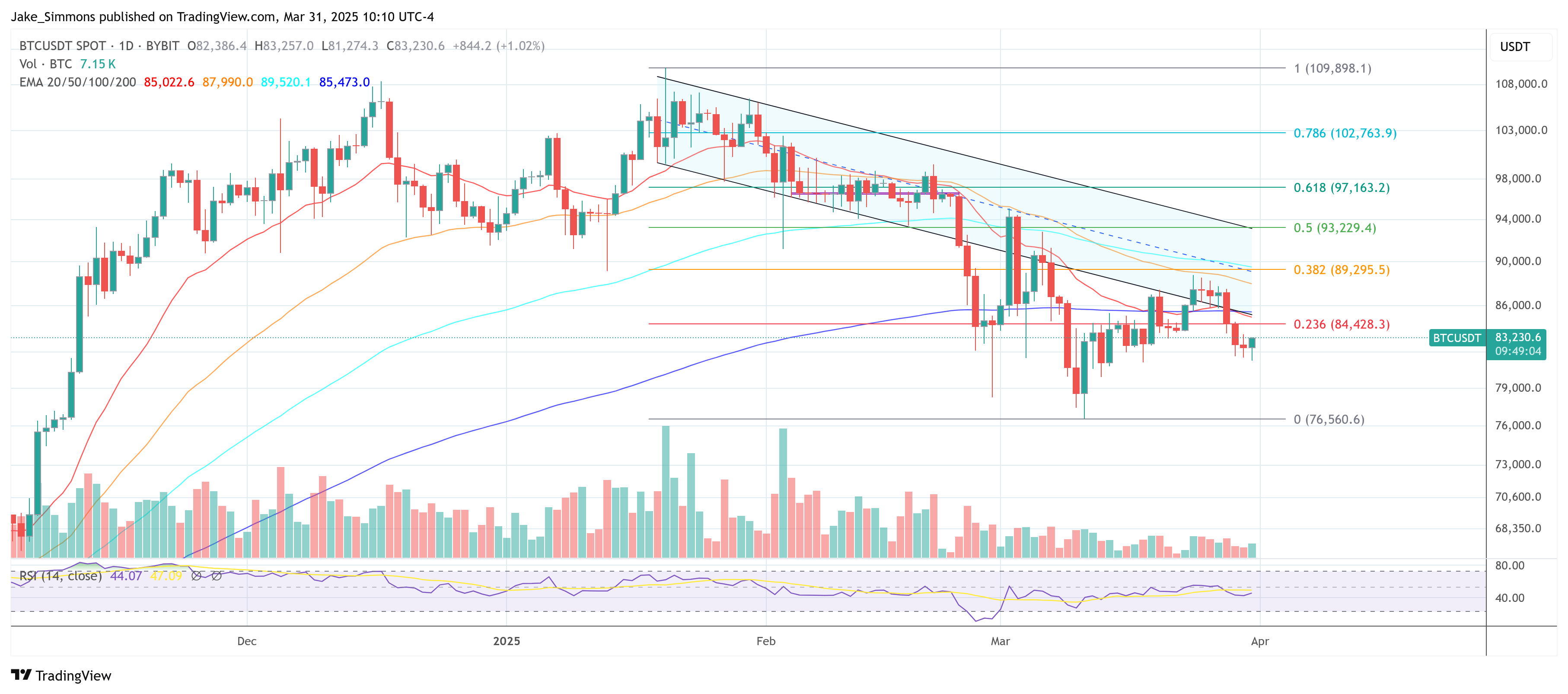Purpose to belief
Strict editorial coverage that focuses on accuracy, relevance, and impartiality
Created by business specialists and meticulously reviewed
The best requirements in reporting and publishing
Strict editorial coverage that focuses on accuracy, relevance, and impartiality
Morbi pretium leo et nisl aliquam mollis. Quisque arcu lorem, ultricies quis pellentesque nec, ullamcorper eu odio.
Este artículo también está disponible en español.
Crypto markets edged decrease Monday following a stark warning from Goldman Sachs, which raised its 12-month US recession chance to 35%, citing rising tariffs, weakening progress, and deteriorating sentiment. The reassessment follows the agency’s second upward revision in March to its 2025 US tariff expectations, signaling an more and more fraught macroeconomic setting with direct implications for danger belongings — together with cryptocurrencies.
Within the word titled “US Economics Analyst: A Additional Enhance in Our Tariff Assumptions”, Goldman economists Alec Phillips, Tim Walker, and David Mericle define their rationale: “We now anticipate the typical US tariff fee to rise 15pp in 2025 […] nearly your complete revision displays a extra aggressive assumption for ‘reciprocal’ tariffs.”
Goldman anticipates that President Trump will announce across-the-board reciprocal tariffs averaging 15% on April 2. Adjusted for product and nation exclusions, the efficient rise in common tariffs is predicted to be round 9 proportion factors.
The affect on the macro outlook is stark: Goldman has downgraded its 2025 US GDP progress forecast by 0.5pp to 1.0% (This fall/This fall), lifted its yr finish core PCE inflation forecast to three.5% (+0.5pp), and elevated its unemployment projection to 4.5% (+0.3pp). These revisions mirror a stagnating progress setting paired with inflationary pressures — a mixture that constrains financial stimulus choices.
The financial institution attributes the rise in recession chance to 3 key elements: a decrease progress baseline; deteriorating family and enterprise confidence; and “statements from White Home officers indicating higher willingness to tolerate near-term financial weak spot.”
Regardless of traditionally poor predictive energy from sentiment measures, Goldman writes: “We’re much less dismissive of the current decline as a result of financial fundamentals aren’t as sturdy as in prior years. Most significantly, actual earnings progress has already slowed sharply and we anticipate it to common just one.4% this yr.”
Implications For Crypto
Whereas digital belongings have lengthy been seen as uncorrelated to conventional macroeconomic variables, that narrative has developed. Bitcoin, particularly, has turn out to be more and more conscious of broader macro circumstances — significantly liquidity, danger sentiment, and actual yields.
Associated Studying
Because the yield curve inverts as soon as once more — a traditional recession sign — macro analysts are warning of a singular coverage dilemma. As @ecoinometrics famous on X: “The yield curve is inverting once more, a standard recession sign. However not like previous cycles, the Fed is unlikely to hurry to QE resulting from inflation considerations. This creates a double problem for Bitcoin: potential risk-off strain with out the stimulus reduction that usually follows. Bitcoin may be very a lot pushed by macro as of late. It’s behaving like a high-beta play on the NASDAQ 100.”
Nonetheless, not everybody agrees {that a} recession poses a net-negative danger for crypto. In a current interview, Robbie Mitchnick, International Head of Digital Property at BlackRock, supplied a nuanced view of Bitcoin’s macro sensitivity: “Financial fears. I imply, I don’t know if we’ve a recession or not, however a recession could be an enormous catalyst for Bitcoin […] It’s catalyzed by extra fiscal spending and debt and deficit accumulation. That occurs in a recession. It’s catalyzed by decrease rates of interest and financial stimulus. That tends to occur in a recession.”
Mitchnick acknowledges the short-term constraints — the wealth impact, diminished disposable earnings, and excessive correlations with equities — however maintains that structurally, Bitcoin advantages from the long-term penalties of recessionary coverage responses. “Bitcoin is lengthy liquidity within the system… and to some extent over simply fears of normal social dysfunction […] that too, sadly, is one thing that may come up in a recession.”
He provides that present market reactions might not mirror Bitcoin’s true positioning: “The market has nearly, it appears, gotten this in some methods not significantly nicely calibrated… however that’s the place the chance is available in for schooling in a market and an asset class that’s nonetheless very nascent.”
At press time, BTC traded at $83,230.

Featured picture from iStock, chart from TradingView.com





















